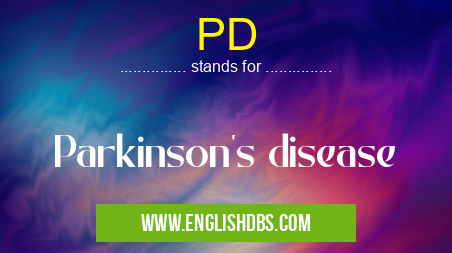What does PD mean in DISEASES
Parkinson's disease is a serious neurological disorder that affects over 10 million people worldwide. It is a progressive disorder that causes problems with movement, balance, and coordination. Symptoms typically include tremor, stiffness, slowness of movement, and difficulty walking. In addition to physical symptoms, people with Parkinson's may experience depression, fatigue, and memory problems.

PD meaning in Diseases in Medical
PD mostly used in an acronym Diseases in Category Medical that means Parkinson's disease
Shorthand: PD,
Full Form: Parkinson's disease
For more information of "Parkinson's disease", see the section below.
What is PD?
PD stands for Parkinson's Disease. This debilitating neurological disorder affects the central nervous system and its ability to control certain movements in the body. As the disease progresses, patients can become increasingly disabled as the tremors worsen and the muscles become weaker. Over time this can significantly reduce their quality of life and require extensive care or assistance from family or professional medical providers.
Living with PD
Living with PD can be frightening due to the fact that there is no cure yet; however, medications can help keep symptoms under control and slow down the progression of symptoms. Physiotherapy is also used to help maintain mobility and muscle strength; however there are many lifestyle changes that can be made to cater to individual needs which will greatly improve quality of life for those suffering from PD. These include eating a healthy balanced diet with plenty of vitamins and minerals as well as engaging in moderate exercise regularly in order to keep healthy levels of fitness up.
Essential Questions and Answers on Parkinson's disease in "MEDICAL»DISEASES"
What is Parkinson's Disease?
Parkinson's disease is a chronic and progressive movement disorder, meaning that symptoms continue and worsen over time. It affects the nerve cells in the brain that produce dopamine, which is a chemical messenger responsible for transmitting signals within the brain that allow for smooth, coordinated function.
Who is most likely to get Parkinson's Disease?
Parkinson's disease is most common among people aged 60 and older. It can affect anyone, though it is more prevalent among men than women.
What are the signs and symptoms of Parkinson's Disease?
Common signs and symptoms of Parkinson's disease include tremors, stiffness of the limbs or trunk, slowness of movement (bradykinesia), loss of balance/posture coordination problems and changes in speech. Other symptoms may include depression and cognitive impairment or changes in behavior or memory.
What causes Parkinson's Disease?
Although researchers know that genetics play some role in causing Parkinson's disease, they haven't yet identified a direct cause. The exact cause remains unknown but factors such as environmental toxins, head injuries and infections have been linked to an increased risk for developing the condition.
How is Parkinson's Disease diagnosed?
To diagnose Parkinson's disease, doctors usually start with a thorough physical exam to evaluate movements and reflexes. Other tests may include neurological exams, imaging tests (such as MRI or CT scans) or blood tests to help rule out other conditions that have similar symptoms
Can stem cell therapy treat Parkinson's Disease?
Stem cell therapy has not yet been approved by medical authorities as treatment for any neurological disorder including Parkinsons' disese; however some clinical trials are ongoing to investigate this potential benefit that stem cells might offer in treating Parkinsons' disese.
Are there lifestyle changes I should make if I have PD?
Lifestyle modifications can be incredibly helpful in managing the effects of PD on daily life activities and preventing further progression of the disease where possible. Keeping your body active with regular exercise will help maintain balance and muscle strength; eating healthy food high in antioxidants could protect you from inflammation-related damage; getting regular sleep; managing stress through relaxation techniques like meditation; avoiding dangerous environments; taking supplements as recommended by your doctor; joining support groups- all these could be beneficial for improving your quality of life with PD
Final Words:
PD is a serious neurological disorder that has no known cure but there are treatments available to help manage symptoms and reduce disability caused by progression of the disease. People living with PD should seek tailored advice from health professionals about how best to manage their condition in order for them to lead full lives despite having the illness.
PD also stands for: |
|
| All stands for PD |
